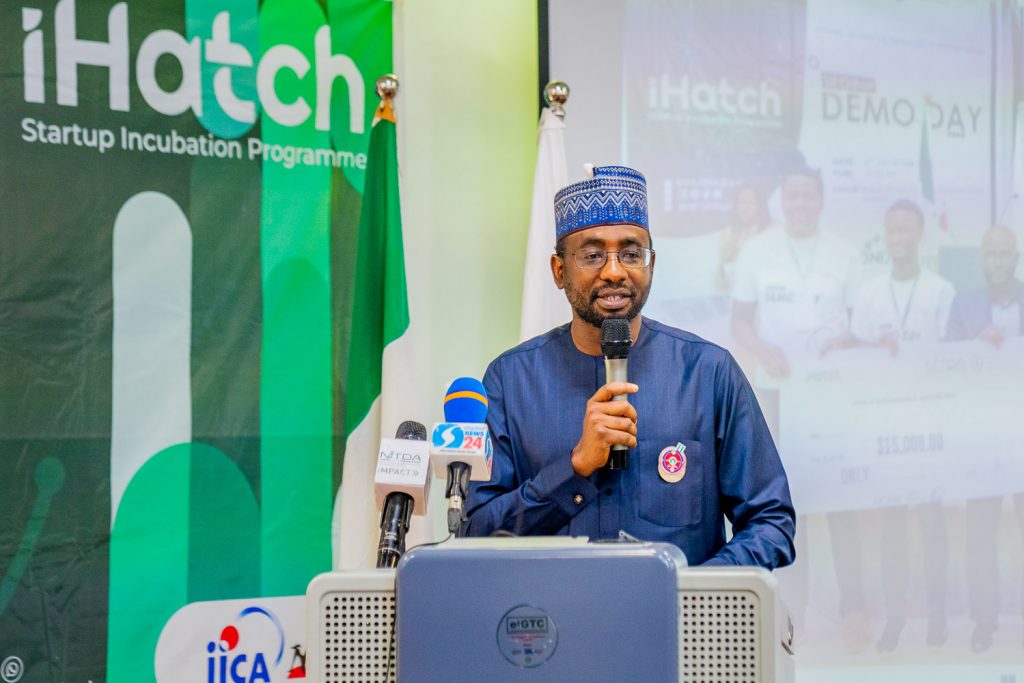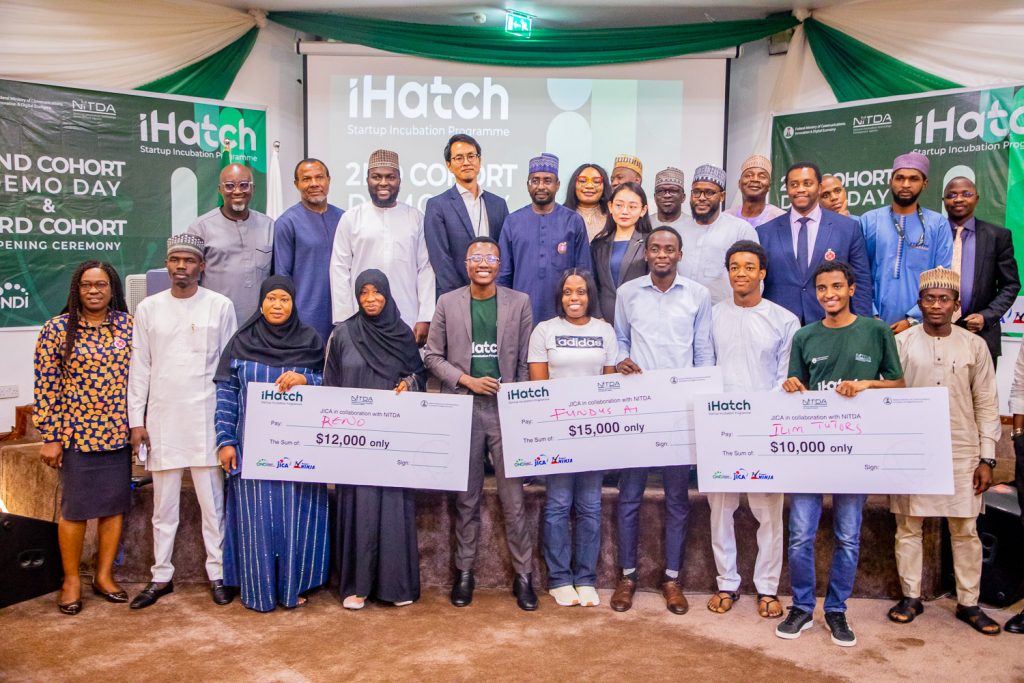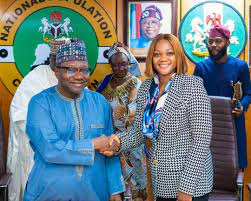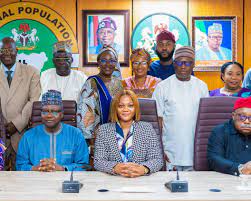Opinion
How 2019 Elections Will Shape Southwest Polls
Published
5 years agoon
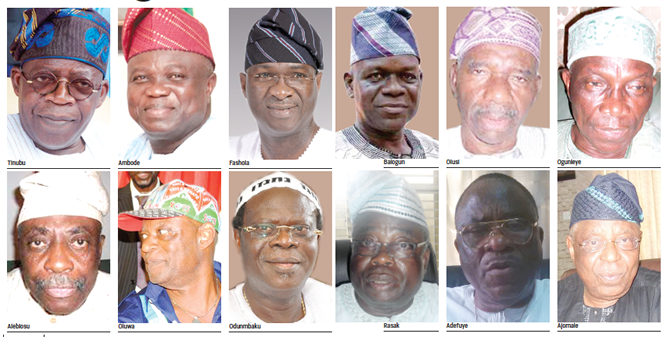
The premier newspaper in this report reviews some of the major political events that took place in the Southwest in 2018 and how they may affect the 2019 general elections
The year 2018 will certainly go down in the political history of the South West as eventful, for recording some very phenomenal developments that may shape the 2019 elections in the zone.
From Lagos to Ogun, Ekiti to Osun, Oyo and Ondo, major political actors in a bid to maneuver their opponents and remain relevant caused major upsets in the political space especially during the primaries of the ruling party, the All Progressives Congress, APC. The conundrum that trailed some of the primaries across most of the parties is yet to settle.
Specifically, the Peace and Reconciliation Committee set up by the APC to address concerns and grievance of those who lost out in the party’s primaries held between September 29 and October 6 has so far been unable to persuade aggrieved members to sheathe their swords. This means that the APC in the South West may be going into the 2019 election with a divided house.
Lagos State
Lagos State recorded a major upset in the political turf with the dropping of Governor Akinwunmi Ambode from proceeding with his second term ambition in 2019 by the state leadership of the All Progressives Congress (APC).
This was said to be despite interventions by President Muhammadu Buhari’s proxies and governors aimed at staving off what they claimed was a damaging crisis in one of the party’s strongest bases.
Political observers say Ambode lost out not because he was not performing but simply because he fell out with party leaders across the state, and was therefore tagged “not a party man”.
In his place, Babajide Sanwo-Olu, a former Special Adviser, commissioner and immediate past chief executive officer of the largest public corporation in the Centre of Excellence, the Lagos State Property development Corporation, was favoured with the governorship ticket of the party.
Mr Ambode will thus go down in the history of the state as the first governor to do one term in the current dispensation.
A similar fate befell Senator Gbenga Ashafa, Lagos East ostensibly for being at Ambode’s earlier declaration.
Some watchers of Lagos politics say there may be upset at the election, given the array of contenders from the other political parties whose profiles and personal achievements are intimidating, but unfortunately, the gubernatorial candidates have rather than base their campaigns on issues, have continued to pursue the mundane, focusing on Tinubu’s stranglehold on Lagos..
Unlike in 2015 governorship election where Tinubu’s candidate, Mr Akinwunmi Ambode had only the Peoples Democratic Party (PDP) candidate, Mr Jimi Agbaje to contend with, this time Mr Sanwo-Olu and the APC will have Mr Babatunde Gbadamosi of the Action Democratic Party, ADP; Chief Owolabi Salis of the Alliance for Democracy, AD; Mr Jimi Agbaje again and few others to contend with.
A source close to Ambode’s camp said, “It is sad though. End of one-man’s rule may finally be here. There is enormous interest in what those disaffected with Lagos APC primaries will do. It will significantly affect presidential and governorship elections results in Lagos. If they all act their conscience and hidden agenda, then an earthquake will happen in Lagos.
“It is the era of the revolution to free Lagos now. Tinubu may have installed the last governor in open elections.”
In August, the gruesome murder of the chairman of the PDP in Apapa Local government created viral ripples which had yet to settle in the party. One of the outcomes of the aftermath of the murder was the defection of the erstwhile state chairman of the party to the APC, alongside his supporters.
Ekiti State
Ekiti state experienced a major upset in the July governorship election with the immediate past governor of the state, Mr Ayodele Fayose, of the PDP being the biggest casualty. His political son and deputy, Prof. Kolapo Olusola and flag bearer of the PDP in the election reportedly lost Irepodun/Local Government Area, where Mr Fayose hails from to Mr Kayode Fayemi of the APC whom Fayose beat in 2014 with the infamous 16-0 defeat.
The battle has since shifted to the Election Petition Tribunal as Prof. Olusola headed to the tribunal to challenge Fayemi’s victory which was allegedly manipulated by the Independent National Electoral Commission, INEC and security operatives.
The two senators and five House of Representatives members still with Fayose lost in their local government areas just as the senator representing Ekiti South, Senate Deputy Minority Leader, Mrs. Biodun Olujimi, lost her Ekiti East Local Government to the APC.
House of Representatives members in Ekiti South, Akin Awodumila and Segun Adekola lost in Gbonyin and Ekiti South-West where they hail from in the same manner Senator Duro Faseyi (Ekiti North) lost his Ilejemeje Local Government to APC. Two other House of Representatives members, Thaddeus Aina and Kehinde Agboola, lost in in Ido/Osi and Ikole council areas.
Another big casualty was the Speaker of the House of Assembly Mr. Kola Oluwawole, who lost his Moba Local Government Area to APC, alongside the lawmaker for Moba 2, Mr. Badejo Anifowose.
Several commissioners and local government chairmen could not deliver their council areas in the APC hurricane that has confounded political pundits.
For the PDP, it is believed that the outgoing ruling party suffered some internal sabotage from senior members, who did not believe in Olusola’s candidacy.
The APC’s victory was largely attributed to the success of the post-primary reconciliation. Nobody defected. All the party’s leading lights were on the same page, unlike in the PDP where some key members, including former Minister of Works, Prince Adedayo Adeyeye, defected to the APC.
Osun State
The Osun State governorship election also produced some upsets following the victory of Gboyega Oyetola, the candidate of the APC winner of the 2018 election.
Mr Oyetola was returned as governor-elect at the end of a supplementary election which held in seven polling units across four local governments. INEC had scheduled the rerun after declaring the earlier election inconclusive; saying the margin of votes with which the leading candidate, Senator Ademola Adeleke of the PDP polled was less than the number of cancelled votes in the seven polling units.
The APC candidate won six of the seven units amidst allegations of harassment and other forms malpractice. At the end of the tally of votes, the APC candidate scored a total of 255,505 votes while the PDP candidate scored a total of 255,023 votes.
Despite the irregularities reported by journalists and observers, INEC officials at the collation centre all said the election went on smoothly.
But one major upset in the election was the support of the Social Democratic Part, SDP, candidate in the election, Senator Iyiola Omisore who became a beautiful bride to be courted by the PDP and the APC and against all expectations; Omisore pitched his tent with the APC, a development which gave the party its victory.
Similarly, the crisis that trailed the APC primaries in the state is yet to settle as some leaders of the party that defected to the Action Democratic Party (ADP) had not returned a situation that could undermine the victory of APC in the state if the party leadership failed to bring them back before the 2019 general election.
Pundits say the ADP governorship candidate in Osun, Alhaji Moshood Adeoti “is still influential. Yet, Adeoti is not happy with the way he was forced out of the APC before the 2018 governorship contest in the state. The APC may lose some legislative seats if the case of Adeoti is not attended to.”
Oyo State
Oyo State was not insulated from major upsets arising from the APC primaries. Like other aspirants that contested different primaries, the Minister for Communications, Mr. Shittu Adebayo, vowed not to support the APC governorship candidate in the state, Chief Adebayo Adelabu.
Mr Adebayo’s reason is that Adelabu is a stooge of the APC National Leader, Senator Bola Ahmed Tinubu.
The minister threatened that there would be no peace in the ruling APC, especially in Oyo State chapter without restitution and justice due to what he ascribed to injustice and unfairness that characterised the APC primaries in the state.
“So, restitution should come before the reconciliation. With this injustice, I will be a bastard to support the APC candidate in Oyo State in the next governorship election after I was defrauded out of the party’s primary election held last October.”
Ogun State
The refusal of the National Chairman of the APC, Adams Oshiomhole, to accept Governor Ibikunle Amosun’s preferred choice of governorship candidate in Ogun State has worsened the crisis rocking the party in the state.
The state executive of the party insisted it would only recognize Adekunle Akinlade as the APC’s governorship candidate and vowed not to work for its governorship candidate, Dapo Abiodun, in 2019 except President Muhammadu Buhari directed otherwise.
Despite all efforts by the Presidential Reconciliation Committee led by Sandra Oladele to settle all aggrieved parties including Governor Amosun, the latter have threatened to work against the APC during the 2019 general election.
Already, Amosun’s allies, who lost out in the party’s primaries, had defected to the Allied Peoples’ Movement, APM, to pursue their political aspirations.
Prominent among Amosun’s allies that defected were Hon. Adekunle Akinlade, who in vain sought the Ogun APC governorship nomination; Hon. Mukaila Kazeem, who was seeking a return ticket to the Abeokuta North/Obafemi-Owode-Odeda federal constituency seat and Chief Tolu Odebiyi, who resigned from the APC after losing the Ogun West senatorial ticket.
Observers argue that these defections may negatively affect the ruling party in the state in the 2019 elections.
On the other hand, gladiators in the Ogun State governorship contest on the PDP platform are yet to sheathe their sword. The national leadership of the party, recently, in Abuja, presented Ladi Adebutu with the symbolic party flag, as its Ogun State governorship candidate.
National chairman of the party, Prince Uche Secondus, said the party had submitted Adebutu’s name to INEC as required by law, adding that by the presentation, Adebutu is the authentic governorship candidate of the party for Ogun State.
But in a swift reaction, Senator Buruji Kashamu, who was recently recognised by INEC as the party’s governorship candidate in the state based on the ruling by a Federal High Court, said that Secondus should be held responsible “for breach of public peace and safety should there be a breakdown of law and order in Ogun State” in the build up to the 2019 general election.
”The desperation shown by Secondus is only typical of a mercenary who is hell-bent on delivering on the job he has been paid to do. His latest action was done in utter disregard to the party’s constitution and subsisting judgment of courts – from the High Court to the Supreme Court – which the INEC has since complied with.
“What is more, even if PDP presents 10,000 flags to Adebutu, it does not change the fact that the courts have pronounced the Engr. Adebayo Dayo-led Ogun State PDP Exco as the only party structure recognized by the law in Ogun State. It is merely ceremonial. It does not change the lists of candidates accepted, processed and published by INEC. It cannot change the verdicts of the High Court, the Court of Appeal and the Supreme Court. It cannot also change the wide acceptance of our aspiration by the good people of Ogun State and beyond.”
Political watchers in Ogun State say this state of affairs may likely cost the PDP the state.
Ondo State
Although, the governorship election will not be taking place in 2019, the governor, Mr. Rotimi Akeredolu, is being accused of unjust treatment and unfair play during the party primaries in the state.
20 lawmakers of the State House of Assembly, who were denied return tickets, accused the NWC of highhandedness and imposition, claiming that only six lawmakers were offered return tickets.
They claimed that Akeredolu denied them return tickets after the APC National Working Committee, NWC, had agreed to reward all the senators and federal lawmakers that supported President Buhari during the face-off with the National Assembly.
It was gathered that Akeredolu worked against the senator representing Ondo North Senatorial District, Prof. Ajayi Boroffice and his counterpart in Ondo South Senatorial District, Senator Omoyele Omogunwa. It took the intervention of the presidency before they could secure their return tickets.
At the moment, Akeredolu’s allies and aides are said to have defected to the Action Alliance, AA, to pursue their political aspiration. Dr. Tunji Abayomi, who was a senatorial aspirant in Ondo North, defected to the AA just after the primaries. Among others, Mr. Lucky Ayedatiwa, another senatorial aspirant in Ondo South, also defected.
Akeredolu had also vowed “not to support all the aspirants imposed on the Ondo APC in the contest for the national and state assemblies.
From the state of affairs in the affected states, observers say the peace committee might not be able to address diverse issues of injustice and unfair treatment, which most aggrieved aspirants alleged, characterised the APC primaries conducted and this may cause major upsets in the 2019 elections in the South West.
These major events will one way or the other shape the 2019 elections and the Southwest may never remain the same again.
You may like
-
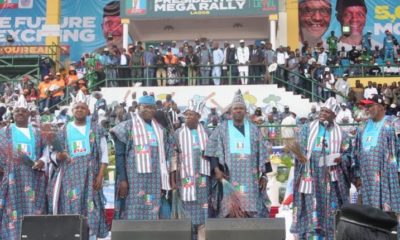

Lagos Will Give Buhari 85% Of Votes – Ambode Declares
-


Federal Government Offer N27, 000 Minimum Wage
-


UPDATE: How Musiliu Akinsanya Stabbed – Wasiu Ayinde
-


Am Not Abuse Ambode, Says Wasiu Ayinde
-
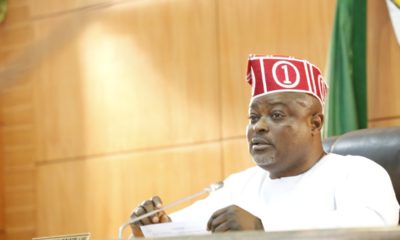

Ambode Must Appear Before Us To Present 2019 Budget, Lagos Assembly Orders
-
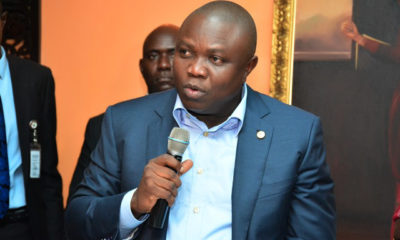

Just In: Investment In Entertainment Industry Will Improve Lagos GDP – Ambode
Opinion
IHATCH: JAPAN GOVERNMENT TASK TO LEVERAGE NIGERIA’S YOUTHFUL POPULATION- DG NITDA
Published
5 months agoon
December 3, 2023
By James Ishaku
As part of the current administration of President Bola Tinubu’s commitment towards creating meaningful opportunities for Nigerian youths, the Director General Of the National Information Technology Development Agency (NITDA), Kashifu Inuwa CCIE has called on the government of Japan to leverage on the youthful population through strategic talent partnership that will nurture and build a workforce that can be exported.
The DG made the call at the Ihatch startup incubation programme 2nd cohort demo day and 3rd cohort opening ceremony organised by the subsidiary of the agency, Office for Nigerian Digital Innovation (ONDI), in partnership with Japan International Corporation Agency (JICA) in Abuja.
Inuwa noted that the ihatch 5-month free intensive incubation programme executed by the ONDI and hosted within the National Centre for Artificial Intelligence and Robotics (NCAIR) is designed to help Nigerian tech entrepreneurs refine their business ideas through a series of coaching, lectures, and booth camps to develop scalable and adaptable business models that willfocus on youth, innovation, entrepreneurship, and technology.
He added that the incubation programme will be held simultaneously in Abuja, Lagos, Port Harcourt, Gombe, and Kano and JICA has agreed to extend the Fourth Cohort across each of the 36 States and the FCT. This is to enable wider reach and to stimulate the startup ecosystems across the States.
The DG stated that not fewer than 1,218 applications were received for the Second Cohort and the number was pruned down to 8 startups, comprising 16 persons, a Founder and Co-Founder for each startup, after undergoing levels of rigorous selection process conducted by a panel of judges, comprising experts in diverse areas of technology and innovative entrepreneurship.
He explained that the selection process assessed the startups’ ideas based on the criteria of profitability, scalability, social impact, idea technique, competitive advantage, experience, and a clearly defined future roadmap.
Inuwa further revealed that a total of 11,183 applications were received from across the 6 geopolitical zones for the Third Cohort. This culminated in the selection of the top 8 startups, comprising 16 founders in total that will participate in the Third Cohort that was launched.
He added that 16 startups that participated in the first and second cohorts of the iHatch incubation programme have moved on to achieve remarkable success in the areas of job creation, funding, participation in events, and valuable partnerships which have created a combined total of 179 direct jobs in the span of agriculture, health, education, and e-commerce sectors.
The DG further asserted that apart from the total grant of US$45,000 (US$15,000 each) for Proof of Concept (POC) to the top 3 startups in the first cohort, some of the startups have raised some funding through other sources. Xolani Health (a health tech startup from the first cohort) secured a grant worth US$155,000, BetaLife (a health tech startup from the first cohort) secured an angel investment of US$60,000, Gifty (an e-commerce startup from the second cohort) got a grant of USD$8,000 while two other startups from the first and second cohorts respectively, raised a combined total grant of US$6,000.
Inuwa affirmed the agency’s commitment to working with relevant stakeholders and partners towards the successful implementation of the Nigeria Startup Act (NSA) which will accelerate innovation and provide much-needed jobs for our teeming youths. Leaving nothing to chance in our resolve to nurture the entrepreneurial spirit in our youth to catalyze the Nigerian digital economy to the next level.
The Honourable Minister, Federal Ministry of Industry, Trade and Investment, Doris Nkiruka Uzoka-Anite, represented by National Coordinator, National Talent Export Programme, Dr Femi Adeluyi, applauded NITDA for the various initiatives and programs put in place for the advancement of the tech ecosystem in the country.
Anite noted that the NITDA DG at the Digital Nigeria International Conference 2023 edition harped on the need for Nigeria to become the talent destination of the world where countries will come to seek a workforce that will work with them towards achieving their goals and objectives.
She added that “technology is a pivotal tool in all aspects of life which cannot be overemphasized and the green transition scoreboard global total has reached about $7.13 trillion for export and about $6.6 trillion for importation, the important aspect is that 54% of these activities is digitally edible and prepares people to be effective and efficient in the different sector of the economy is laudable”.
The Minister also appreciated JICA for its relentless efforts toward the advancement of the tech ecosystem in the area of automobile, development, training, scholarships, interventions and a lot more which has impacted the citizens directly or indirectly.
The Ambassador of Japan to Nigeria, Matsunaga Kazuyoshi, represented by Yuzurio Susumu Chief of Nigeria Office in his remarks stated that Nigeria is the most popular country in Africa and the heart hub of entrepreneurship activities aimed towards the advancement of the country.
He added, “With all the challenges faced by insecurity, and limited infrastructures in the country, Nigerian startups are demonstrating remarkable creativity and resilience in developing solutions that other critical social issues in areas such as education, transportation, healthcare and finance”.
He added that the present administration has identified the transformation potential of startups and digitization making it a key factor in diversifying the Nigerian economy from its dependence on oil.
The Ambassador pointed out that startups are seen as a catalyst for business transformation, bringing fresh ideas, innovative technologies and new employment opportunities. Japan has the longest history of technological innovation and entrepreneurship has a significant role in supporting the Nigerian system.
Among those who attended were representatives from both the private and public and the top three (3) startups emerged with cash prices to Fundus AI 1st postion $15,000.00, Reno 2nd postion with $12,000.00 and Ilim Tutors 3rd postion $10,000.00 respectively.
Coker – Odusote: 100 Days at the Helm of NIMC
By Walter Duru, Ph.D
It was Albert Einstein that once said that “setting an example is not the main means of influencing another, it is the only means.” That sentiment expressed by Einstein is the primary essence behind the theory of transformational leadership, which requires passion, charisma, and the ability to motivate others. Transformational leaders are usually very authentic, emotionally intelligent, great listeners, results-focused, visionary, and self-aware.
In just 100 days at the helm of the National Identity Management Commission (NIMC), Engr. Abisoye Coker-Odusote has ushered in a new era of transformational leadership, leaving an indelible mark on the organization. Her eventual confirmation as substantive Director General/Chief Executive Officer of the Commission did not come to many as a surprise.
She did not waste time to hit the ground running and showed commitment to advancing the NIMC’s mission and mandate.
Coker-Odusote has taken steps to streamline National Identity Number (NIN) registration processes, while addressing the long-standing challenges associated with identity registration in Nigeria. This, she is handling through strategic restructuring and the integration of advanced technologies with a view to significantly reduce waiting time and enhance the overall efficiency of the system.
Today, date of birth and other kinds of modifications at NIMC happen within 48 hours. The several years backlog of date of birth modifications she inherited are almost cleared, as she had given a one-month deadline for the same to relevant staff of the Commission.
Again, responses to issues and complaints, such as those whose National Identity Numbers did not hit the NIN Verification Portal are now resolved within 24 hours.
Recognizing the paramount importance of data security in the digital age, the NIMC CEO has taken steps to enhance data security by introducing robust measures to fortify the protection of citizens’ sensitive information. This includes, but not limited to the adoption of cutting-edge encryption technologies and the establishment of a dedicated cybersecurity team.
Her interest in improving service delivery at NIMC cannot be overemphasized. She has concluded plans to ensure regular training and retraining for staff of the Commission, emphasizing customer-centric approaches, to ensure a more positive experience for citizens seeking identity services.
On partnerships, Coker-Odusote, leveraging her extensive network and expertise, has forged strategic partnerships with governmental agencies, private organizations, and international bodies. These collaborations aim to enhance the NIMC’s capacity, foster innovation, and promote information sharing for the betterment of identity management.
Understanding the pivotal role of technology in modernizing identity management, Engr. Coker-Odusote has spearheaded the integration of biometric advancements and artificial intelligence into the registration and verification processes.
This not only improves accuracy, user experience and ease of enrolment, but also positions NIMC at the forefront of technological innovation in identity management. A typical example is the NIMC Contactless Biometric Solution, which delivers a best-in-class fingerprint and facial capture image output quality, powered by Artificial Intelligence. The new solution was unveiled by the commission at the 2023 Identity Day, held in Abuja on September 16, 2023.
In addition, Engr. Coker-Odusote tackled the existing backlog of unprocessed identity requests head-on. Through a combination of strategic staff deployment and redeployment, process optimization, and digitization initiatives, she has made significant strides in clearing the backlog, demonstrating her commitment to prompt and efficient service delivery.
Recognizing the crucial role played by the NIMC staff in achieving organizational goals, the CEO has developed for implementation, a robust welfare programme aimed at boosting morale and fostering a positive work environment. This includes, but not limited to training opportunities, health benefits, and performance recognition initiatives.
Furthermore, in consultation with in-house experts, elaborate public awareness campaigns are being planned, to ensure that citizens are well-informed about the importance and benefits of identity registration. These campaigns are expected to not only educate the public, but also serve to demystify the registration process, encouraging greater participation.
The NIMC DG has concluded plans to take the ecosystem enrolment forward by taking steps to deepen collaboration with ecosystem implementing partners, supporting to ensure the success and optimal performance of the Nigeria Digital Identification for Development (ID4D) Project, a Nigerian Project jointly funded by The World Bank, The European Investment Bank, and the French Development Agency.
Engr. Coker-Odusote’s strategic vision, commitment to efficiency, and emphasis on technological innovation positions NIMC for a future where identity management is not only secure but also seamlessly integrated into the daily lives of citizens.
On anti-corruption, the NIMC DG has left no one in doubt on her determination to sanitize the system, entrench a culture of transparency and zero tolerance for corruption. Apart from putting systems and structures in place to discourage graft, she is directly involved in ensuring that the cankerworm has no place in the commission.
Just recently, in what one may describe as a sting operation, she paid an unscheduled visit to the Federal Capital Territory office of the commission, where she is reported to have arrested some staff for allegedly extorting money from Nigerians, even as she has maintained that enrolment was free.
Her devotion to supporting the policy direction of the present administration by strengthening the issuance of the NIN for access to service is not in doubt.
Speaking on Coker-Odusote’s first 100 days in office as NIMC CEO, Project Coordinator, Nigeria Digital ID4D Project, Musa Odole Solomon described her as a vibrant, results-focused leader, determined to make a difference in the Commission.
“She has taken steps to build bridges of collaboration between NIMC and partners within the country’s identity ecosystem. These collaborations aim to enhance the NIMC’s capacity, foster innovation, and promote information sharing for the betterment of identity management in Nigeria.”
“The collaboration is also focused on enhancing handshake with institutions involved in the country’s identity ecosystem, with a view to deepening integration with the country’s Identity Management System.”
“In 100 days, she has taken the lead in working with the Nigeria Digital ID4D Project to speed up project implementation process, especially, processes geared towards the extension of NIN enrolment to hard-to-reach areas, women, persons with disabilities, and marginalized groups, thereby fostering inclusion and access to social services.”
“She has introduced some innovations that I consider very progressive, and things are moving very well. The Nigeria Digital ID4D Project is happy to work with her, as she has shown that she has all it takes to assist us succeed.”
Responding to a question on his impression about the NIMC DG’s leadership style and the future of the relationship between NIMC and his organisation, Chairman, National Population Commission (NPC), Hon. Nasir Isa Kwarra stressed that the relationship between NIMC and NPC has become more robust under Coker-Odusote’s leadership as NIMC CEO.
“I want to say that the National Population Commission has a long and robust collaborative partnership with the National Identity Management Commission (NIMC) in our efforts to harmonize and integrate biometric databases for planning and development of our country.”
“However, this partnership has become more dynamic and robust with the assumption into office of Engr. Abisoye Coker-Odusote as the Director General of NIMC. She has shown an unparalleled commitment and passion in working with the Commission, not only in registration of births and deaths, but also the upcoming population census. She comes across as a thoroughbred professional and innovator who will give Africa’s greatest nation a deserved identity profile for national unity, security, and development. I am more confident in the future of the Identity Management Commission under her.”
Responding to a question on the new grounds covered at the NIMC ICT, Director, IT/Identity Database of the Commission, Chuks Onyepunuka has this to say:
“Our DG is pragmatic, proactive, result-oriented and visionist. Her achievements in ICT in NIMC in the last 100 days include, but not limited to: “launching of self-modification and enrolments services to ease and simplify the processes for enrolment services; driving the clearing of about 3 million backlog of enrolment records awaiting manual adjudication within 3 weeks; decentralization of operations with objectives of ensuring that we are closer to the enrolees and adequate coverage in the nooks and crannies of the country.”
“Others are improvement in the process of engaging and revalidating our Frontend Enrolment Partners (FEPs); improvement in our ICT policies, processes and procedures; resolution of 95% challenges/issues affecting our window enrolment software (Res-Web) and commenced the integration and harmonization with National Population Commission, Nigeria Immigration Service and Federal Inland Revenue Service (FIRS).”
Adding her voice, NIMC’s Director, Business Development and Commercial Services, Mrs. Carolyn Folami described the DG as a thoroughbred professional, committed to resetting the Commission for the good of the nation.
“It has been only 100 days, but it seems she has been here far longer, as within this period, we have achieved a couple of goals towards resetting the NIMC agenda and resettling the NIMC staff for productivity.”
“Starting with the planning and commencement of training of all staff, to the commitment to all Front-End Partners (FEP) to revalidate the business model for fair play and payment. She is very keen on stakeholder engagement and has secured the buy- in of our harmonisation partners for effectiveness. She is professional, thorough, dedicated, and above all, kind to all.
Adding his voice, Monitoring and Evaluation Specialist, Project Implementation Unit, Nigeria Digital ID4D Project, Dr. Emmanuel Akogun argued that Coker-Odusote’s first 100 days in office were characterised by “dynamic, focused and results – oriented leadership,” adding that there is steady progress in NIN enrolment, with “103,500,000 Nigerians and other legal residents captured in the NIMC Database.”
There is therefore no gainsaying the fact that Engr. Abisoye Coker-Odusote’s first 100 days as CEO of the NIMC have been marked by a series of commendable achievements.
At this point, one can confidently say that with Engr. Bisoye Coker-Odusote as Chief Executive Officer, NIMC is in safe hands.
Her recent confirmation as substantive Director General/CEO of the Commission is clearly an act of patriotism by the Nigerian President, Bola Ahmed Tinubu.
However, as she commences a full tenure of office, following her recent confirmation, one expects that the standard is not lowered.
As she marks 100 days in office this week, the most challenging part of Abisoye Coker-Odusote’s journey as Chief Executive Officer of the NIMC is the need to sustain the successes recorded, remain focused, deepen stakeholder engagement and public enlightenment, check corruption, strengthen systems and structures, be fair to all, while supporting the policy direction of the present administration.
Deliberate steps must be taken to ensure the sustenance of the war against extortion at NIMC.
Again, a deliberate plan should be in place to ensure a more robust stakeholder collaboration, particularly with those involved in the country’s identity ecosystem.
Elaborate, sustained communication and public enlightenment activities are required, taking advantage of the conventional and unconventional channels of communication to inform, educate and mobilize the citizens on the need for all to register for the NIN. This requires a deliberate strategy and strategic implementation.
Finally, a deliberate inclusion strategy must be in place and vigorously implemented to ensure that no one is left behind.
As the DG continues to lead with passion and purpose, NIMC is poised for even greater accomplishments under her guidance.
Indeed, NIMC is in safe hands!
Dr. Walter Duru (Assistant Professor of Communication and Multimedia Design) is a Communication/Public Relations Strategist, Researcher and Consultant. He could be reached on walterchike@gmail.com
Opinion
Telecoms: Operators seek strict harmonised RoW charges
Published
5 months agoon
November 25, 2023AJAGBE ADEYEMI TESLIM
SPONSORED BY: H&H
Telecom operators have urged the federal government to make a policy that will make the charges on the Right of Way (RoW) uniform across the country.
According to them, the issue of RoW has been a major challenge hindering the deployment of telecom infrastructure while the infrastructure is vandalised in some areas.
Right of Way charge is a levy paid by telecommunication companies to state governments, permitting telecommunication companies to dig up the roads and install telecommunications hardware such as optic fibre cables that carry internet traffic.
The Right of Way charge has been fraught with inconsistencies across the states in terms of charges and has negatively impacted broadband infrastructure.
To harmonize the Right of Way charges for broadband infrastructure investment, the Federal Government, in 2017, through the National Executive Council (NEC), approved a policy, which resulted in a RoW Charge Agreement reached with all the governors of the 36 states of Nigeria.
However, the RoW Charge Agreement is yet to be fully adopted by the 36 States, and in recognition of the slow uptake by the States, the former Minister of Communication and Digital Economy, Isa Pantami, on January 14 2020 in a press statement called on states to implement the harmonization of the RoW charges for obvious benefits for the sector such as deepening development/growth in broadband infrastructure, and reducing the transfer of RoW charges costs by telecommunications companies to customers.
January 2020 recorded a step in the right direction when the Nigerian Governors Forum accordingly resolved that telecommunication operators were to pay N145 (approximately $0.37) per linear metre to lay fibre cable anywhere in the country.
Meanwhile, despite these, the telecom operators have continually complained about the different charges leveled by different states for the Right of Way.
According to them, the issue of the RoW has been worrisome affecting the laying of telecom infrastructure in some states in the country.
They said this has also been the bane of telecom services in some areas, especially in the cities where people do not enjoy the services.
The operators noted that if there is harmonisation and every state in the country abides by the rule, telecom services will be everywhere across the country.
“If such policy is wrong and strict, there will be unification in the charges for the Right of Way by all the states. And even the payment will be easy. And to make the policy strong, the Federal Government must declare telecom infrastructure as national infrastructure.
Once it becomes a national infrastructure, you don’t need to talk about being paid or not being paid.
All that the telco company needs to do is to pass through the agency that is in charge. You write the agency and get your cables laid.
Except the Right of Way affects someone’s building, which is very difficult. If it affects someone’s building, that is a different thing, but if it does not, what you just need is to get approval from the agency in charge. If this is achieved, the broadband penetration we are talking about will be easily expanded,” telco operators said.
Trending
-

 News5 years ago
News5 years agoBreaking: ‘Penalty’ Crooner Small Doctor Caught in Possession of Fire Arms
-

 News5 years ago
News5 years agoTiffany Trump Is Dating a Millionaire Michael Boulos From Nigeria
-

 News5 years ago
News5 years agoPDP Set To Cause Panic Days To Polls: FG
-

 News5 years ago
News5 years agoINEC Engages EFCC, FIU In Tracking Campaign Funding
-
News2 years ago
INEC Publish Final List of Candidates For 2022 Osun Governorship Poll
-

 Politics5 years ago
Politics5 years agoPDP Alleges Plot by APC, Presidency to Detain Its Leaders
-
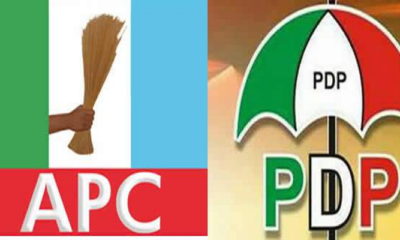
 Politics5 years ago
Politics5 years agoLagos Commissioner Decamps To PDP
-

 Politics5 years ago
Politics5 years agoOsinbajo Has Betrayed Yorubas, Says Afenifere






